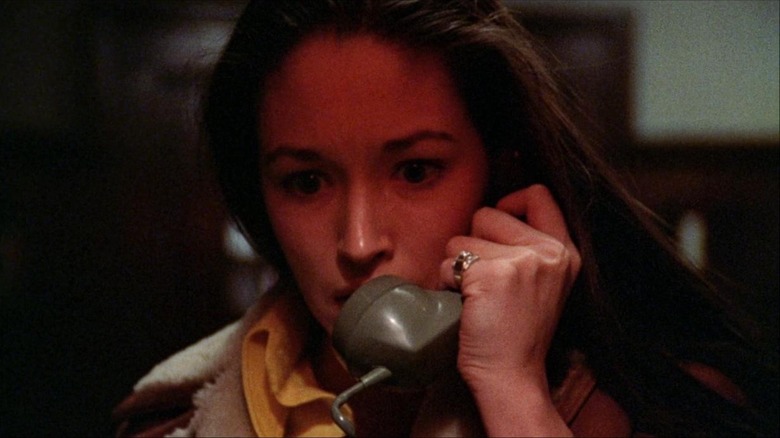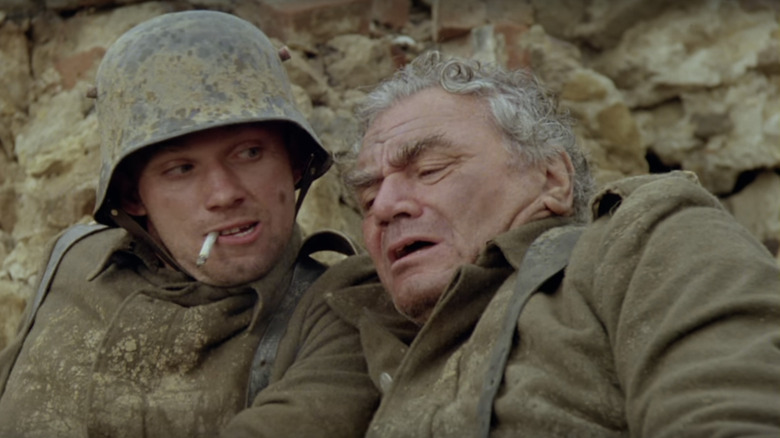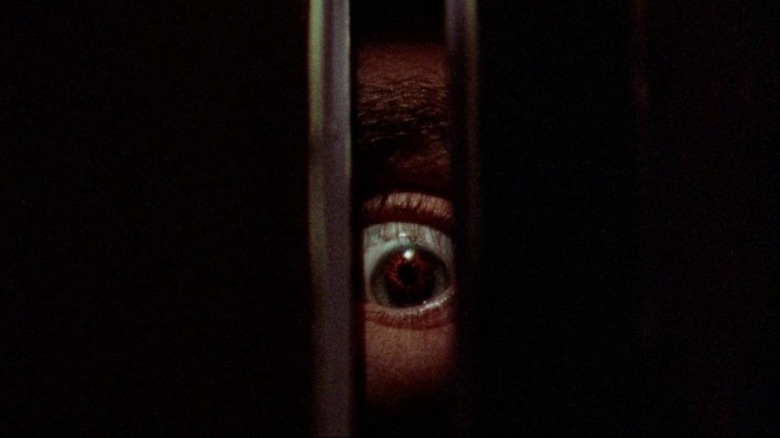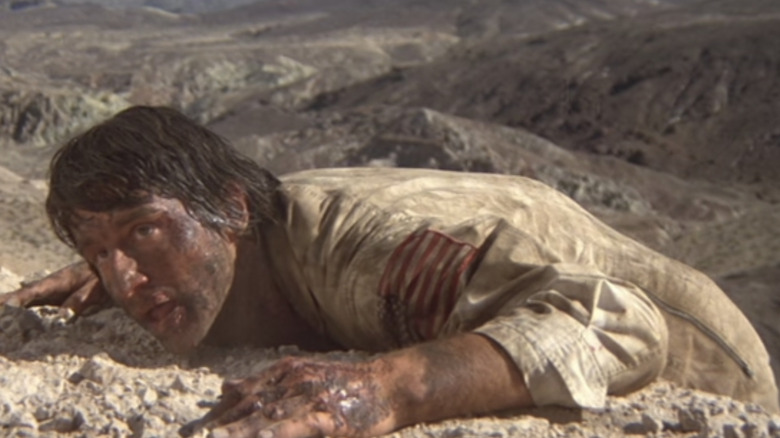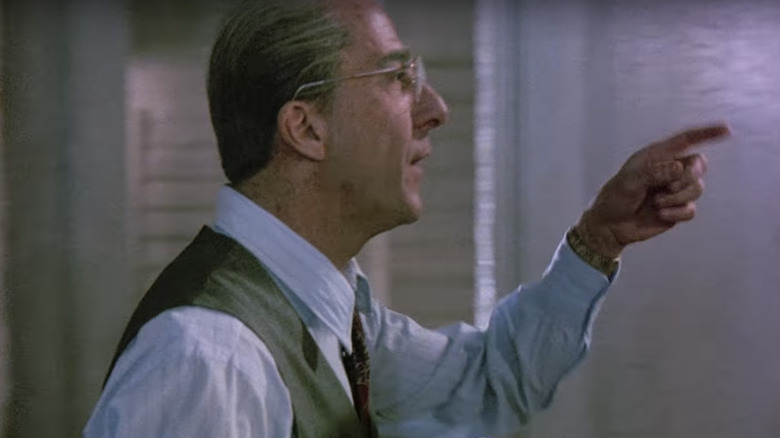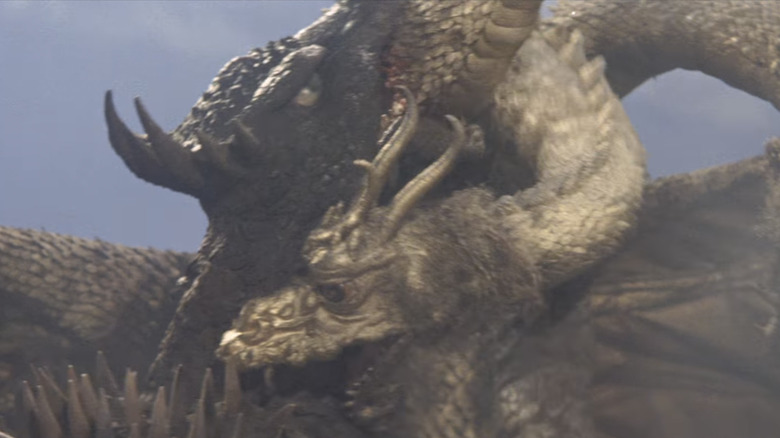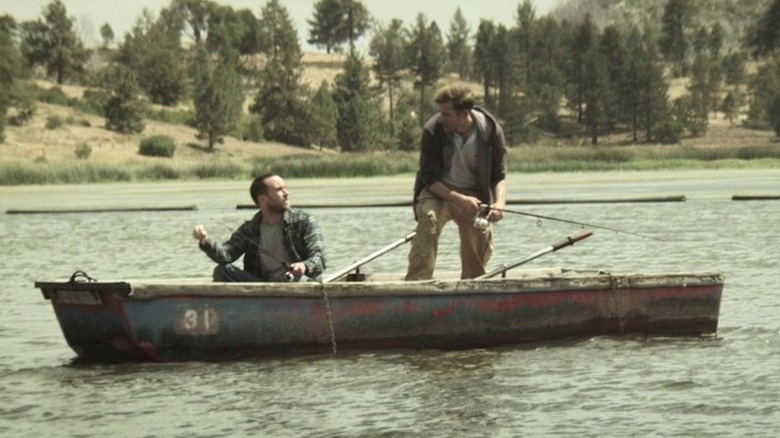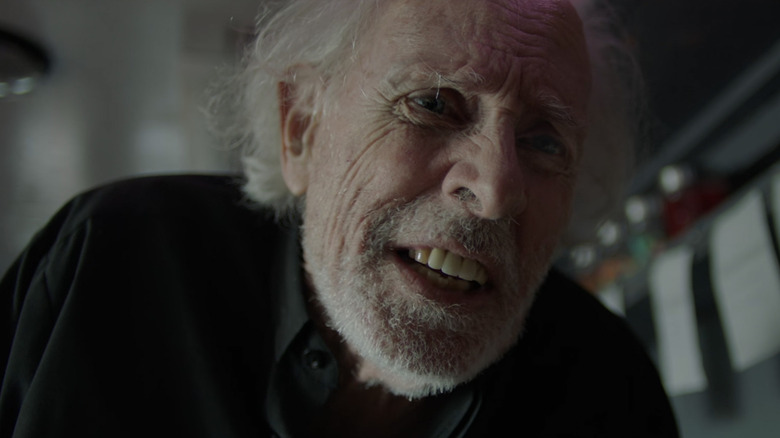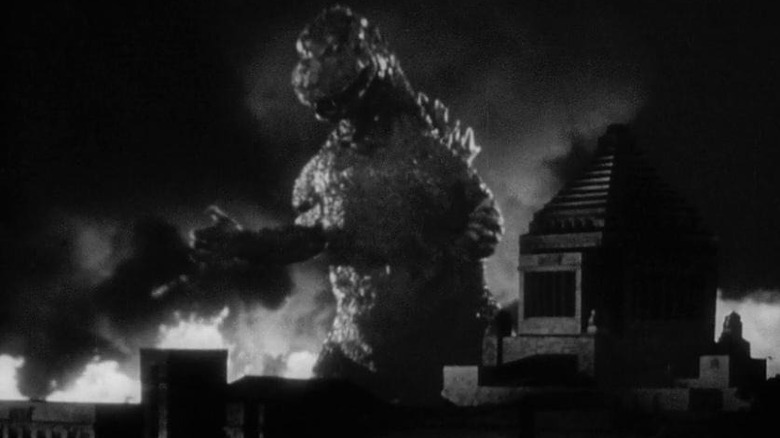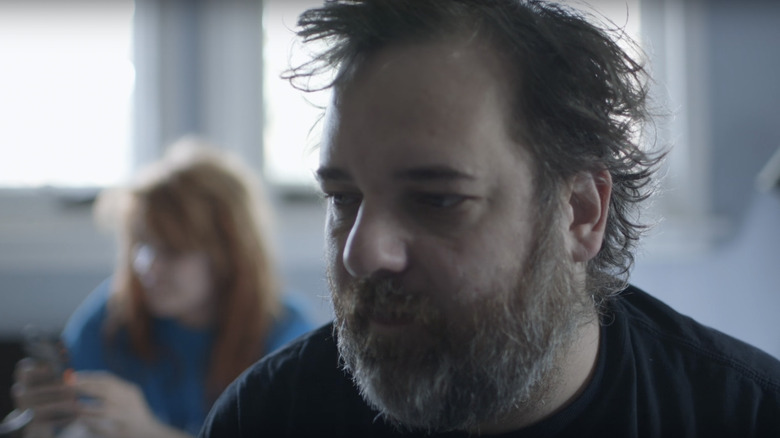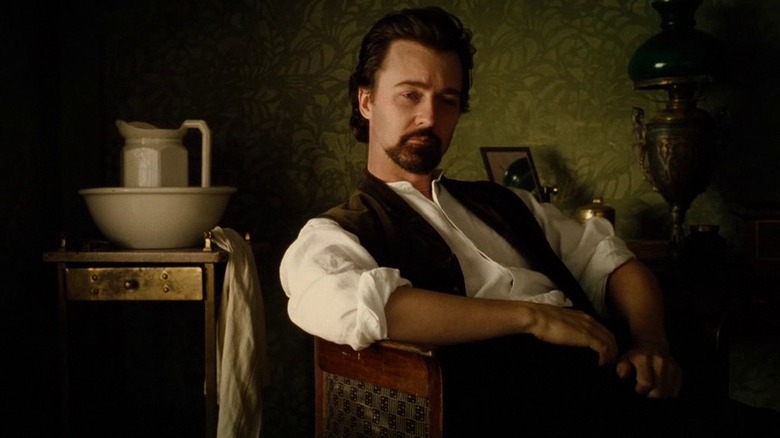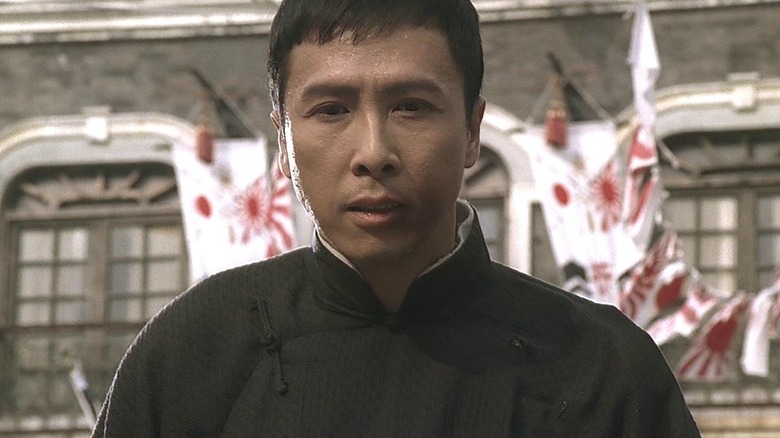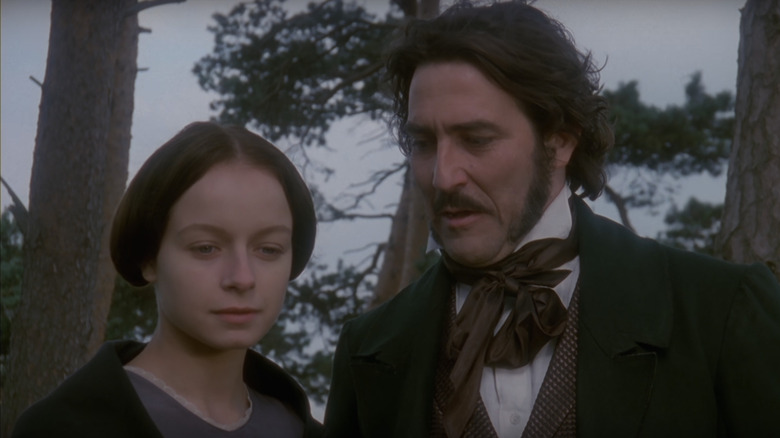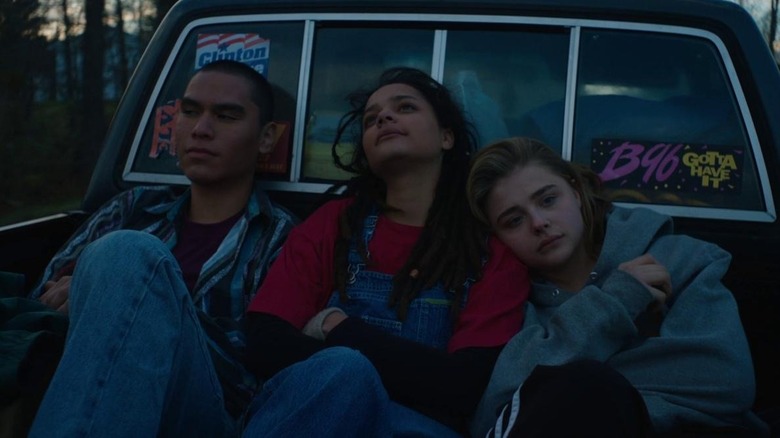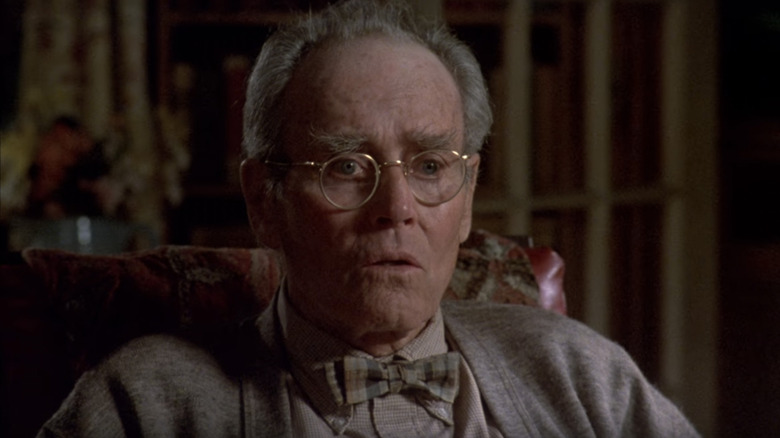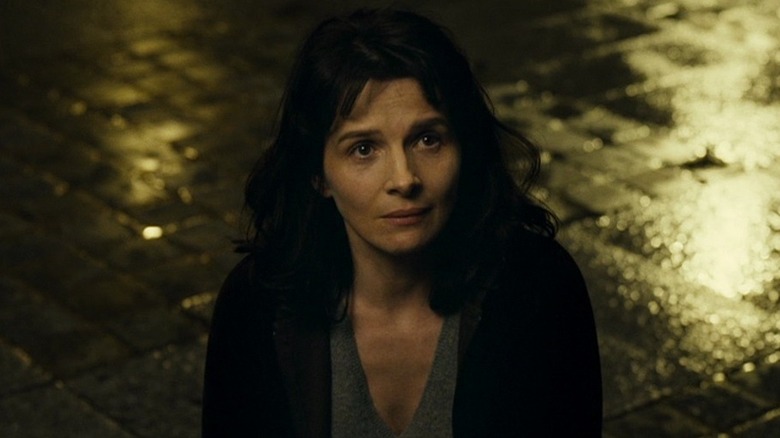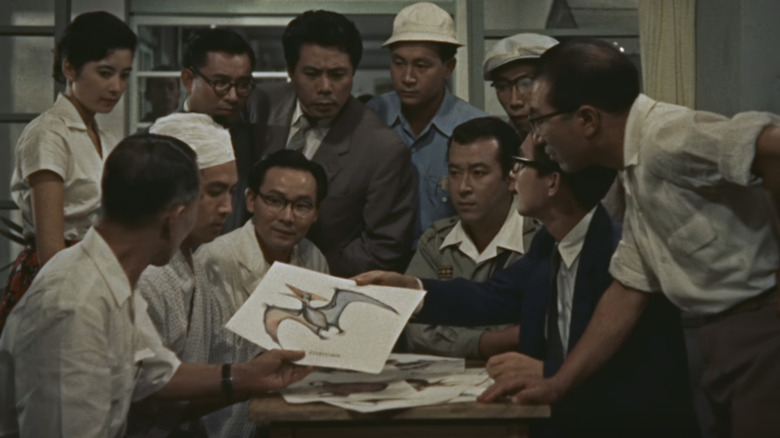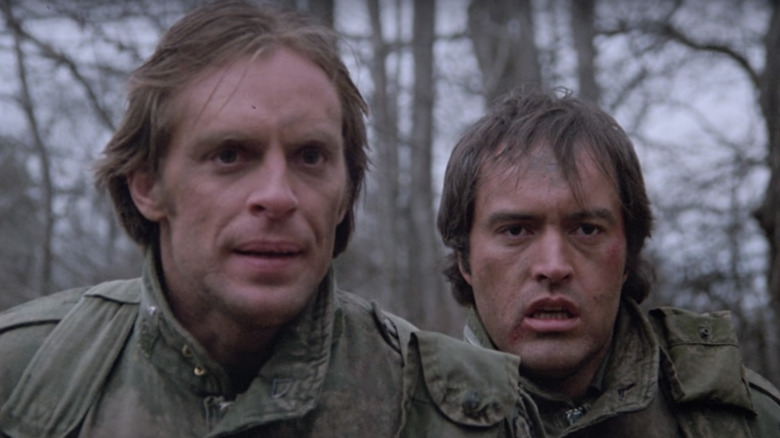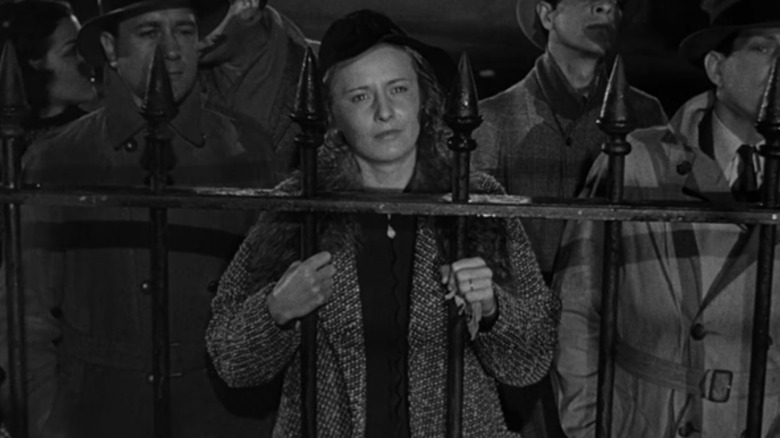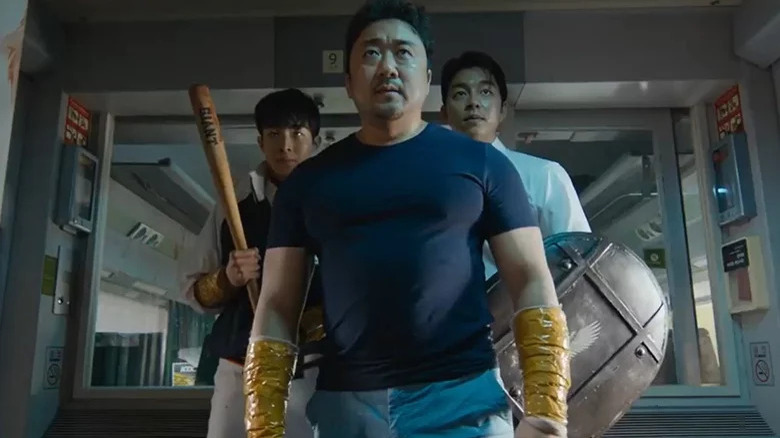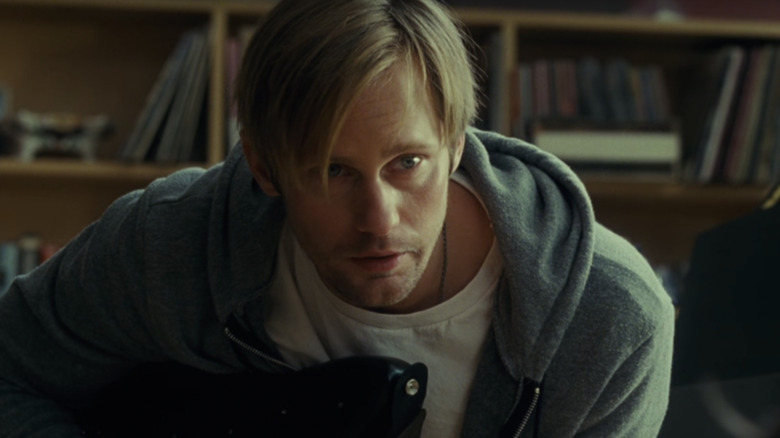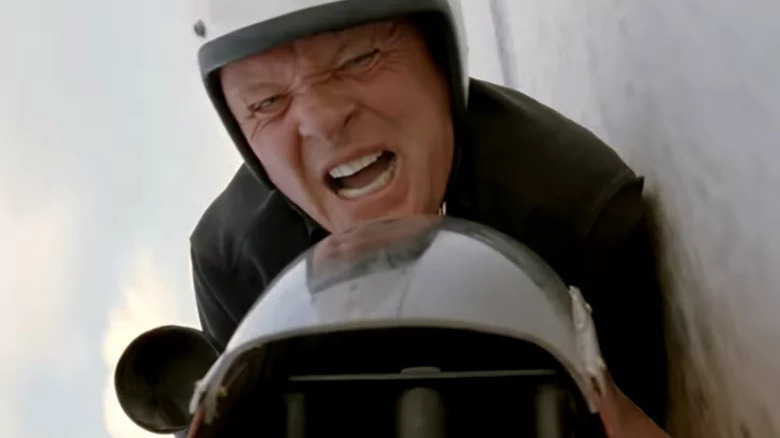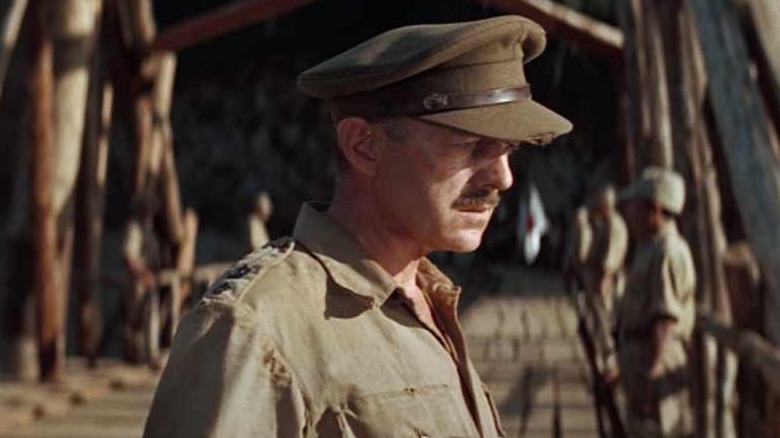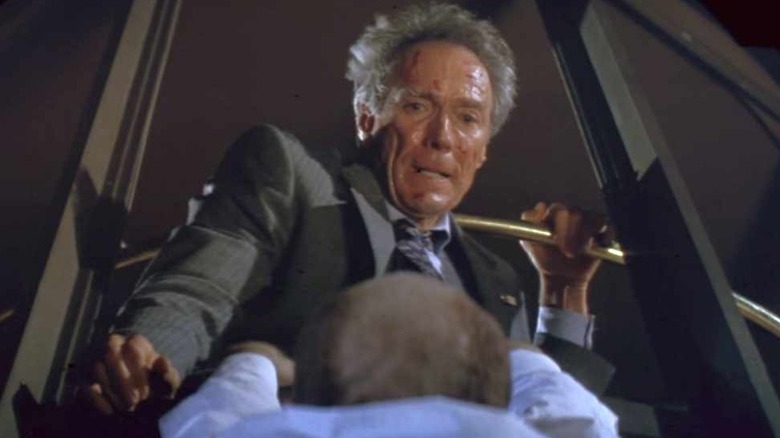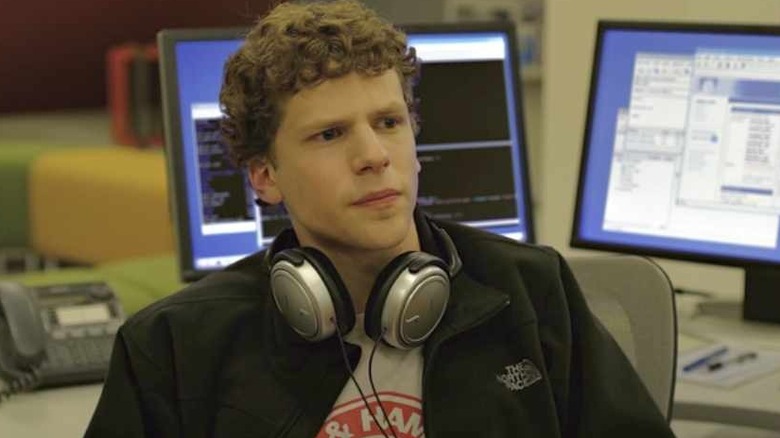The 24 Best Free Movies On YouTube Right Now
With so many streaming services out there — the good, the mediocre, the free, and increasingly expensive — it can be easy to forget about YouTube ... or at least about its many legitimate offerings. While YouTube started out as a place to share amateur videos, it's long since grown into an industry of its own. Still, when you think about the site's appeal, you might focus on vloggers or the original programming featured on YouTube Premium. It's easy to assume that any free copyrighted content YouTube distributes but doesn't own has been uploaded by individual users in some under-the-table piracy.
In fact, YouTube also offers a wide variety of legitimate free movies, and all you have to do is sit through a few ads. The site has an eccentric and frequently changing selection of freebies, and it's always worth sifting through its listings to see what you can find. In case you don't have time for that, however, we've rounded up a bunch of our favorites, drawing from all different kinds of genres. Let's look at the best films streaming for free on YouTube.
All Quiet on the Western Front
Few war stories are as harrowing as "All Quiet on the Western Front," and its stark, grim grace comes across perfectly in this 1979 television film. The movie follows young Paul Bäumer, alongside his friends and his comrades-in-arms, through their WWI service. Paul enters the war full of romantic idealism, his passion for a noble quest stoked by a teacher who, notably, has no plans to volunteer for the fight. He soon learns the bloody and bitter reality of war, which he mostly experiences as a grinding, pointless horror. His bond with (some of) his fellow soldiers provides the only bright spot — and that becomes its own torment as his friends die off all around him.
The film is obviously bleak, but it's also beautifully crafted. The New York Times heaped praise upon it on its release, complimenting its clarity and structure and adding: "It is sensitive, still powerful and, in many ways, spectacular. ... The performances, all of them, are extraordinarily good. Mr. [Ernest] Borgnine, solid and restrained, has rarely been better. Mr. [Richard] Thomas is never less than admirable, proving once again to be an actor of intense dedication." The acting helps convey the staggering human cost of the war, magnifying the movie's effectiveness. It's painful to watch, but it's worth it.
Black Christmas
This early slasher — premiering in 1974, it even predates John Carpenter's genre-solidifying "Halloween" — is a dark, atmospheric masterpiece. "Black Christmas" features an incredible cast full of familiar faces, including Olivia Hussey, Margot Kidder, Keir Dullea, and horror icon John Saxon, and it creates characters who are richer and more realistic than the stalk-and-slash norm.
Olivia Hussey stars as Jess, a serious young woman in the midst of a personal crisis. On top of that, her sorority house keeps getting obscene phone calls. The more jaded girls can dismiss and even ridicule the unknown caller's heavy breathing and grotesque sexual advances, but he soon escalates to wild shrieks, different voices, and threats of murder. When sweet, responsible Clare turns up missing, it kicks off a police investigation — one that eventually reveals part of the terrifying mystery behind the phone calls.
While time has lessened the impact of the biggest twist in "Black Christmas," it definitely hasn't diminished the film's deftly handled characterization, well-incorporated humor, moody atmosphere, and strong sense of place. Did we mention scares? There are scenes and images here that have a permanent place in our nightmares: You'll never think of a plastic bag the same way again. The ending is the perfect, ambiguous cherry on top.
Over the years, the film has become a cult horror classic that's popular with fans and critics alike: It's earned both a spot on Bravo's list of scariest movie moments and retrospective articles praising its feminist overtones.
Capricorn One
When conspiracy theorists insist that the moon landing was all an elaborate, well-funded hoax, there's one movie they like to point to: "Capricorn One," a paranoid seventies thriller where NASA strong-arms its astronauts into faking a Mars mission just so the money keeps flowing. As a Rolling Stone article put it, "It didn't matter that the film was fictional, nor that it was poorly reviewed, nor that O.J. Simpson played one of the astronauts: the film had the effect of propagating [the conspiracy] theories, to the degree that footage from 'Capricorn One' continues to be used in 'documentaries' suggesting that the moon landing was a hoax."
The moon landing was real, and "Capricorn One" is absolutely fiction — but in spite of the lackluster early reviews Rolling Stone mentions, we think it's good fiction: A satisfying and well-constructed thriller with a strong cast that includes heavy hitters like Hal Holbrook, James Brolin, Elliott Gould, and Karen Black. Fans of movies like "The Parallax View" should certainly check it out.
In addition to praising the actors' "tight ensemble work," Donald Guarisco at AllMovie wrote, "The script is peppered with plenty of rapid-fire dialogue worthy of a Howard Hawks comedy ... and [director] Peter Hyams applies plenty of style and pizzazz to the film's action set pieces .... The thrills Hyams generates are bolstered by ... Bill Butler's sharp widescreen cinematography and Jerry Goldsmith's rousing, militaristic score."
Death of a Salesman
The 1985 television adaptation of "Death of a Salesman" made an impressive showing at the Emmys, collecting an award for its art direction as well as Outstanding Acting in a Miniseries or Special awards for Dustin Hoffman (lead) and John Malkovich (supporting) — as well as a whole slew of nominations. Eye for Film praised the performances as "worthy of being labeled 'definitive,'" adding that the actors benefit from a simple adaptation that does little to hide its filmed play status: "It is a sterling, if uncinematic adaptation, without pretense or frippery which could dilute the potency of performances or writing."
The story is the small-scale tragedy of traveling salesman Willy Loman, whose dreams of success have never really come to fruition. Willy is slipping into senility — memories intrude on his experience of reality, his emotions are tempestuous, and his perceptions are unreliable — and his family is struggling to deal with it, even as he heaps judgment upon them. His relationship with his sons, Happy and Biff, takes center stage as the young men grapple with the weight of his expectations.
The original play is a classic for a reason, and this remarkably strong adaptation makes you feel like you're seeing it performed live — and by some of the best actors of the last few decades.
Destroy All Monsters
If you like kaiju movies, you should know in advance that "Destroy All Monsters" isn't just one of the best kaiju movies, it's also one of the most kaiju movies, featuring an epic clash of 11 separate monsters. We almost feel like we should get out an autograph book so we can collect signatures of greats like Godzilla, Mothra, Rodan, and King Ghidorah. Oh, who are we kidding: We'd be too nervous to ask, and they might just flatten us anyway.
This king of all mash-ups takes place after all known kaiju have been safely confined to "Monster Island," where scientists and researchers can study them. Unfortunately, when aliens start mind-controlling the scientists — a standard hazard in sci-fi movies — this means it's all too easy for them to unleash the monsters on the world. Cities will fall until Earth gives in. Needless to say, people don't give up that easily, and soon it's a battle of our monsters against their monsters.
"Destroy All Monsters" provides plenty of kaiju action and satisfaction while also fully acknowledging that, since this is the ninth "Godzilla" movie, we're all really fond of these guys by now and don't want to see them go down.
The Endless
"The Endless" is an ambitious and beautiful sci-fi horror film that makes the most of its modest budget: Instead of pure spectacle, you get thoughtful and innovative chills. The movie is a companion piece to "Resolution," also by directors Justin Benson and Aaron Moorhead; the two films enrich each other, but they can both be watched as standalones.
Of the two, "The Endless" is a shade more complex. It concentrates on two brothers, Justin and Aaron, who have lived marginal and unsatisfying lives ever since Justin forced them to break away from the Camp Arcadia, the cult — or was it a cult? — they grew up in. Aaron misses the easy life, camaraderie, and sense of belonging, and when he and Justin receive a video from Camp Arcadia, he seizes on the excuse to go back for at least a brief visit. Once there, the tension between the brothers amps up, with Aaron embracing the place while Justin can't stop wondering about all its impossibilities. Why doesn't anyone there seem to age? Why is there a second moon in the sky? Who or what is leaving them photographs and videos, and what does it all mean?
The answers are clever and sometimes terrifying, especially in the scene where Justin finds people who are also trapped in the area ... but not having an idyllic Camp Arcadia experience. This is a movie that lingers in our minds long after its credits roll.
Freaks
Chloe is just a little girl, but that wouldn't matter to the dangerous government agency that keeps an eye out for "Abnormals" and tries to capture or kill them: Both her parents and her grandfather are Abnormals. No wonder her justifiably paranoid father, Henry — who can slow time — always tries to keep her inside and out of sight. He wants to give her a normal life someday, but he's terrified that she'll meet the same fate as her mother, who is imprisoned in Madoc Mountain by the ruthless Abnormal Defense Squad. Will Henry's chances of keeping Chloe safe fall apart when she makes it into the outside world? Is there any hope of rescuing her mother?
The superpower elements are well-considered and an immediate draw, but it's how "Freaks" handles them — with skilled acting, personal stakes, and realism — that really makes the movie something special. Gizmodo's review emphasizes the film's delightful combination of science fiction and heart, saying, "[Directors] Stein and Lipovsky stuff 'Freaks' with limitless imagination, finding ways to execute their loftier ambitions. It's a film filled with complex, robust ideas that not only have a unique twist to them but a realistic grounding that makes them more relatable and impactful."
Godzilla
1954's original "Godzilla" is a classic for a reason: It features smooth storytelling, strong pacing, great early creature effects and costuming, and a moving sense of how cooperation and insight can help save the day — and sometimes create new risks. Most of all, it has a powerful subtext about the profound costs of nuclear warfare and experimentation. It's not just a good, fun movie, it's a meaningful one that really resonates with people.
Godzilla is the descendent of a prehistoric sea creature, and it's now evolved far enough to walk on land — much to humanity's dismay. Newly awakened by nuclear testing, Godzilla is now rampaging around and across Japan, destroying ships and villages and withstanding everything the country tries to throw at him.
It's easy to see why the movie has aged so well. As Time Out put it, "More so than in the jokey sequels, this film's Godzilla comes off as a potent and provocative metaphor, a lumbering embodiment of atomic-age anxieties birthed from mankind's own desire to destroy ... The way the filmmaker shoots his central Tokyo-destroying set piece ... feels like a nation exorcizing its demons. 'Godzilla' is Pop Art as purge."
Harmontown
Dan Harmon's "Community" has long been one of our favorite TV comedies. The documentary "Harmontown," like the podcast it springs from, takes the lid off the show's creator and shows you what's underneath. Actually, Harmon himself takes the lid off himself. Over the course of "Harmontown," he reveals his gifts, insecurities, and issues at a particularly vulnerable time in his life: right after he was fired from his own show and set adrift for its fourth season (before his triumphant return for the fifth).
Needing to get a handle on a temporarily "Community"-free life, Harmon went on the road with his podcast and did the rambly live shows that are shown here. We're always happy to see Harmon at work, but the truth is that the draw here is less the content he makes and more the man himself. It's not just a kind of sprawling comedy special, it's also a searching psychological examination.
What does it turn up? Per IndieWire, Harmon comes across as "a clown prince of self-loathing and self-destruction, taking the work as seriously as possible ... but never [missing] a chance to beat himself up in the process." In beating himself up, he also tends to alienate others, including collaborators who passionately admire his work. We hear a lot about difficult geniuses, but it's rare that one gets this kind of warm but open and unsentimental showcase.
The Illusionist
"The Illusionist" came out in 2006, so it got overshadowed by Christopher Nolan's "The Prestige." Now that the two historical magician movies are no longer competing for the same ticket sales, though, it's fine to call off the duel and admit that both are well-worth watching.
"The Illusionist" takes place in 19th century Vienna, where a magician named Eisenheim (Edward Norton) rises from poor, obscure origins to national fame — but his celebrity comes too late, and by the time he's wealthy enough to be a suitable match for his true love, Sophie (Jessica Biel), she's already engaged to the vicious Crown Prince Leopold (Rufus Sewell). Sophie loves Eisenheim and fears Leopold, but she doesn't have much choice in her marriage. Trying to break it off results in a horror that pits Eisenheim against Leopold in an elaborate, public, and illusion-filled battle for justice that has to be mediated by Chief Inspector Uhl (Paul Giamatti).
Roger Ebert noted that "The Illusionist" succeeds mostly by dint of its terrific quartet of central performances, and he reserved special praise for Giamatti: "His expressions and line readings alone are worth the price of admission, as they convey Uhl's uncomfortable position on the horns of a devilish dilemma, or his Holmesian delight in assembling another section of the picture-puzzle."
Ip Man
If you're a martial arts fan who has somehow missed 2008's hit "Ip Man" and its sequels, you need to get to YouTube immediately to soak up all the spectacularly choreographed action. If you're not into martial arts, then you'll be pleased to know that "Ip Man" doubles as an engrossing biopic with a talented and charismatic star.
For those who don't know, Ip Man was a Wing Chun master — a humble but incredibly gifted martial artist who would eventually go on (as "Ip Man" itself will inform you) to teach Bruce Lee himself. His early years are brought to incredibly vivid life by Donnie Yen, whose performance here takes Ip through the dangers and difficulties of the Chinese-Japanese conflict in World War II. The film doesn't stint on the horrors he has to witness and endure, but the focus here is on how, despite everything, Ip persists in showing his skill and character. Some of his feats may be a little exaggerated, but they're always deliciously cinematic.
Variety's Derek Elley attributed the film's success to its superb action, magnetic lead performance, and the way the two combine: "Marbled with humor and inventiveness, and employing just occasional slo-mo, these fight scenes ... grip through their sheer virtuosity rather than visual flash ... Yen, who's taking on real star charisma in middle age, is aces as Ip, with a simple dignity that exactly mirrors the movie's own and a gracefulness in combat that's very different from his trademark whiplash style."
Jane Eyre
There are, of course, numerous "Jane Eyre" adaptations, but we'll always have a soft spot for 1997's TV film adaptation starring Samantha Morton and Ciarán Hinds, two consistently great performers who are at their best here.
It is, as review site The Silver Petticoat notes, an extremely — even brutally — condensed adaptation, one that pares a thick novel down to a mere 108 minutes. When adaptations are this plentiful, though, different approaches are welcome: You will find more faithful and comprehensive takes elsewhere, but this one takes risks that pay off. One of the most controversial aspects is Hinds' more abrasive Mr. Rochester. Hinds eschews an overtly romantic approach until Rochester really begins to soften towards Jane, and while his less attractive beginning rankled a few fans, it makes the romantic payoff incredibly satisfying. This Jane and Rochester are unabashedly flawed and human, and we like that. We're not surprised that The Silver Petticoat's ultimate verdict is that although the film "needs multiple viewings" and "time to percolate," it's one viewers will appreciate more and more as they return to it.
The Miseducation of Cameron Post
Beautiful, delicate, and painful, "The Miseducation of Cameron Post" is an LGBTQ-themed coming-of-age drama about a young girl sent to a fundamentalist gay conversion therapy center.
Cameron doesn't want to be at God's Promise, and she pushes back against the center's stance that her sexual orientation is sinful, wrong, and misguided. She strives to maintain a sense of self while dealing with a process designed to grind her down, and her one real refuge is her friendship with Jane and Adam, two other center misfits. While Cameron goes through some heartbreaking romantic struggles — it's hard to fall in love with someone afraid to openly love you back — the main focus here is on the sense of community she finds and how it enables her to survive her time in a fundamentally harmful institution.
The Irish Times appreciated the complex, nuanced performances the film gets from its ensemble cast and admired how it created an unlikely but successful tone: "It ought to be harrowing, but working from a screenplay co-written with Cecilia Frugiuele, [director Desiree] Akhavan has, despite one awful event, fashioned a hipper, woker, more understated version of your favorite John Hughes movie."
On Golden Pond
The classic family drama "On Golden Pond" is realistic, warm, and human, and it isn't afraid to wear its heart on its sleeve and risk being called sentimental. It's possible that a lesser cast might make it tip over into being a cheap tearjerker — but that's not a problem when you have Katharine Hepburn, Henry Fonda, and Jane Fonda as your central trio.
Hepburn and Fonda play aging married couple Ethel and Norman Thayer, who are — in the face of Norman's encroaching dementia — trying to have one more lovely, relaxed summer at Golden Pond. That prospect is interrupted and complicated by their adult daughter, Chelsea (Fonda), who arrives at the cottage with a new fiancé and teenage soon-to-be stepson in tow. Chelsea has a complicated and sometimes fractious relationship with her father, who she feels tries to control her life, but she needs her parents to watch 13-year-old Billy while she and his father are traveling. The summer becomes an opportunity for everyone to connect, mature, and embrace fleeting joys.
Roger Ebert testified to the film's emotional resonance: "'On Golden Pond' is a treasure for many reasons, but the best one, I think, is that I could believe it. I could believe in its major characters and their relationships, and in the things they felt for one another .... I left the theater feeling good and warm, and with a certain resolve to try to mend my own relationships and learn to start listening better."
Paris, je t'aime
"Paris, je t'aime" is an endearing anthology film that creates a lovely mosaic of Paris. The lengthy list of directors — 22 in all! — is excellent and genre-spanning, incorporating everyone from Joel and Ethan Coen to Wes Craven to Alfonso Cuarón. Their segments have the same kind of variety, switching easily from drama to comedy and from the supernatural to the realistic. All anthology films are unavoidably a little uneven, and it's likely that some stories will work for you and some won't, but all in all, this provides plenty of wit, affection, and a sense of magic.
The movie also makes the most of its short segments, with each story confined to a tight five minutes that, per Empire, are handled with uncommon grace. "Indeed," reviewer Alan Morrison says, "a handful of these films don't require a single additional frame."
Our favorite segment may be the final one, directed by Alexander Payne, where the always great Margo Martindale plays an American tourist who, in the words of critic Josh Larsen, gradually "transforms from a clown to an intimate, sympathetic figure." It's expertly handled by both actress and director, and it makes for a wonderful sendoff.
Rodan
The Japanese monster movie pantheon wouldn't be complete without 1956's "Rodan."
In this kaiju classic, nuclear testing brings back a number of immense prehistoric creatures, most notably the fearsome pteranodon that gets dubbed Rodan. Rodan hatches inside a mine and soon begins laying waste to modern society just by following its instincts. For a while, it has a considerable advantage: No one knows what it is. Both Rodan and its mate keep getting misconstrued as some kind of aircraft, with eyewitnesses unable to make sense of these enormous winged creatures. Soon enough, though, humanity rallies and, with clever use of an active volcano, battles back against the Rodans.
Like King Kong and Godzilla himself, Rodan has a kind of pathos. It's not malicious, it's just a creature that, thanks to troubling human experiments, has awoken in the wrong era. That angle is pivotal to the movie's success because, as TCM notes, it deepens the fun: "[It echoes] the somber tone of 'Godzilla,' leavening the mixture with a dash of compassion for the behemoths making hash of Japanese real estate values." The result is a monster movie with both heart and thought behind it.
Southern Comfort
The great action-thriller director Walter Hill helms this "Deliverance"-like film about a National Guard squad lost and overwhelmed in a Louisiana swamp. If you're like us, that may be all you need to know.
If you happen to need more info, though, we're certainly willing to enthuse over "Southern Comfort" until you're thoroughly sick of us. It stars Keith Carradine and Powers Boothe, two terrific actors who would later be reunited on "Deadwood." PFC Spencer (Carradine) and Corporal Hardin (Boothe) are grounded, reasonable, and often appealingly cynical, but their squad is mostly unskilled and trigger-happy — and there's no way to avoid getting dragged into that kind of trouble. When the soldiers first commandeer canoes belonging to local Cajuns and then "jokingly" aggravate them by firing blanks, the situation escalates to violence ... and it only worsens from there. Soon, the men realize that as long as the National Guard members may report the murders, the locals have no intention of letting them leave the swamp alive.
In a retrospective review, The Dissolve's Noel Murray wrotethat "Southern Comfort" ably shifts between genres, evoking first "lean, story-driven 'men on a mission' war movies," then "the morally complex 1950s Westerns ... where groups of people with conflicting personalities and goals try to make their way through lawless territory," and finally 1980s slasher films. Hill's commitment and the actors' naturalism lets the story go where it wants, and we're happy to follow along.
Stella Dallas
Barbara Stanwyck gives one of her best performances in "Stella Dallas," a beautifully performed and psychologically complex 1937 melodrama that, as The Dissolve's Scott Tobias put it, "earns the copious tears it jerks, embodying the 'weepie' in every respect, yet more complicated and more flush with genuine emotion than a mere soap opera."
Stella is a brash working-class woman who dreams of climbing out of her assigned role in life and entering into a world of glamor, money, and privilege. She's not afraid to stoop to blatant fortune-hunting in her quest, either: That's how she lands Stephen Dallas, who marries her only because his real love is out of reach. Their life together is mostly unhappy, and Stella can never pass for a "natural" member of the elite world she's married into — but the relationship transforms her forever by giving her a daughter, Laurel. Stella's devotion to Laurel is genuine and unselfish, and it completely overhauls her priorities. She goes from focusing on her own social advancement to designing strategies to make Laurel's life as easy and happy as possible. The only problem is that she gradually starts to suspect that she will always be too gauche to belong in the future she wants for Laurel. In fact, her role as Laurel's mother might even keep that future from happening at all.
Train to Busan
The smart, adrenaline-fueled "Train to Busan" is one of our favorite zombie movies. It offers a nearly unbeatable combination of vivid characters and zombie mayhem, and the tight setting — most of the action takes place on the aforementioned train to Busan — is a great gimmick that ups the tension and gives the action a unique framework. We also just get a kick out of watching the characters figure out how to exploit the zombies' weaknesses in order to survive. There's really nothing bad here, and the movie ties it all together with some strong emotional storytelling involving the various families onboard.
Critic Josh Larsen singled out the film's camerawork as a particularly important element: "[It] takes precise advantage of this confined space, emphasizing the survivors' limited options," building up the claustrophobia and always reminding us of the lack of maneuverability. As Larsen points out, this brilliant use of setting allows "Train to Busan" to deliver "cleverly concentrated shot of zombie terror."
There's one other fan we'd particularly like to mention: "Shaun of the Dead" creator Edgar Wright — another one of our favorite zombie purveyors! — praised the film on Twitter, calling it the "best zombie movie [he'd] seen in forever."
What Maisie Knew
Wrenching struggles over child custody are just as current and affecting now as they were in 1897, when Henry James published his classic novel "What Maisie Knew," and this 2012 adaptation updates the story's setting while keeping its pain, insight, and emotional resonance.
Maisie is the quiet 6-year-old daughter of Beale and Susanna, two phenomenally selfish and self-involved people who spend much of their marriage at each other's throats. When they split up, Maisie's living situation becomes a kind of tug-of-war rope in a game neither really wants to win: They both just want each other to lose. In fact, the two people in the movie who genuinely care about Maisie and attempt to look after her are her step-parents, Lincoln (who marries Susanna) and Margo (Maisie's former nanny, who marries Beale). They're the only ones who don't lose track of Maisie's best interests in the midst of all this one-upmanship and relationship turmoil. Remaking a new kind of family out of the ashes of the old may be the best route forward.
Variety admitted that "this beautifully observed drama essentially strikes the same sad note for 98 minutes," but it adds that the film does so "with enough sensitivity and emotional variation to make the experience cumulatively heartrending rather than merely aggravating." As hard as it is to watch such an evocative portrayal of a child's emotional agony, there's a light at the end of the tunnel, and that factor — plus the brilliant performances — make it easy to recommend "What Maisie Knew."
The World's Fastest Indian
"The World's Fastest Indian" is a sweet, down-to-earth sports film that thrives on the charming lead performance of Anthony Hopkins. Since some of Hopkins' best roles have been imposing charismatic villains, it's easy to forget just how good he can be on a small-scale. Here, he's Burt, an eccentric elderly motorbike enthusiast, one who has already established a kind of fame at home in New Zealand and now wants to take on America: in particular, the race at the Bonneville Salt Flats. Circumstances — including his own health — keep conspiring against him, but Burt soldiers on. The movie has a pleasant, episodic structure, with Burt's long road trip punctuated not only by his various obstacles but also by the various allies he makes along the way, giving us plenty of gently endearing portraits of a wide cast of characters. Effectively, this is a heartwarming, quirky travelog with a gratifying sports movie ending.
The movie's immense likability can be summed up by the fact that even New Zealanders got behind it ... despite the fact that one of their real-life countrymen was being portrayed by a Brit. The New Zealand Herald aptly described "The World's Fastest Indian" as "a kids' film for grown-ups," offering a kind of cheerfully optimistic fun, and it praised Hopkins for his "generous, genial and utterly approachable performance."
The Bridge on the River Kwai
Legendary director David Lean and equally legendary Alec Guinness blessed the world of cinema with six collaborations, including the epics "Lawrence of Arabia" and "Dr. Zhivago." Their third, and perhaps the best of the lot, was 1957's "The Bridge on the River Kwai" and it almost didn't happen.
Lean had wanted to cast Charles Laughton as misguided, prideful prisoner of war Colonel Nicholson, and all these years later it's impossible to imagine the classic film without the mustachioed Guinness leading his fellow British POWs to the earworm whistle of "Colonel Bogey March" (later borrowed for films like "The Breakfast Club" and "Spaceballs"), as they traitorously labor on that title bridge for their Japanese captors.
The film was adapted from the 1952 book "The Bridge over the River Kwai" by French novelist Pierre Boulle (who later penned "Planet of the Apes"), and based on the true story of the Burma Railway. "The Bridge on the River Kwai" included standout supporting work by William Holden as Shears and Sessue Hayakawa as Colonel Saigon, and naturally, one of the finest bridges ever constructed for a film.
Sure, it's a shame all that hard work got derailed, but it did introduce the memorable line, "What have I done?" And what did the beloved 1957 wartime drama do? It received eight Academy Awards nominations, walking away with seven Oscars including Best Picture, Actor (Guinness), Director (Lean), and Screenplay (Boulle, who technically shared it with blacklisted writers Carl Foreman and Michael Wilson).
In The Line of Fire
In the history of movies there is one, and only one where gruff Clint Eastwood goes toe to toe (or gun to gun) with a manic, methodical John Malkovich: "In The Line of Fire." Eastwood was almost attached to direct the heart-pounding thriller about secret service man Frank Horrigan, still living with JFK assassination guilt and regrets, but stepped aside to let "Das Boot" and "NeverEnding Story" helmer Wolfgang Petersen do the job.
Malkovich portrays an ex-CIA assassin who sets his sights on the current POTUS, playing relentless mind games with Eastwood's character along the way. Eastwood echoed audience feelings about Malkovich's unforgettable Oscar-nominated performance, telling Roger Ebert in 1993, "He's just so creepy in this picture. There's something kind of mesmerizing about him, even in the way he appears." In a "Primetime Live" interview (via Deseret News), Malkovich had these kind words to say about his co-star, "He's very silent, self-contained. He sort of appreciates a good joke, and he's very straightforward. And you sort of get the feeling as one might have from my father that he actually may shoot you if something doesn't go particularly well."
The film remains one of Eastwood and Malkovich's highest grossing films, and along for the adrenaline-filled ride are a game Rene Russo, Dylan McDermott, Gary Cole, John Mahoney, a wicked plastic pistol, some sleek rounded glass elevators, and a lot of bad hairpieces.
Malkovich would later reunite with Eastwood to lend supporting work to his 2008 picture, "Changeling."
The Social Network
David Fincher is well known for delivering brooding films that take the audience to dark places, like "Se7en," "Fight Club" and "Zodiac." He seemed to do the impossible by bringing that same sensibility to a story that doesn't seemingly lend itself to his cutting style — a handful of Harvard students who stare at computer screens and talk a lot about a website — but he still got there.
With a chilling score by Trent Reznor and Atticus Ross, and a whip smart, polished script by Aaron Sorkin adapted from Ben Mezrich's book "The Accidental Billionaires," Fincher brings to light the backstabbing adventure of how Mark Zuckerberg made The Facebook (later dropping "The") into "The Social Network" that is now a fabric of daily life. Jesse Eisenberg has the thankless job of giving Zuckerberg a bitter, cold beating heart onscreen, and is joined by broken Andrew Garfield, pizzazzed Justin Timberlake, and a double dose of Armie Hammer as the Winklevoss twins.
The 2010 film was a hit with audiences, critics and fellow industry members alike, winning three Academy Awards (Best Screenplay, Score and Editing). It wasn't exactly the favorite film of the subject himself, however.
"I think the reality is that writing code and then building a product and building a company is not a glamorous enough thing to make a movie about," Zuckerberg said in 2014. "So you can imagine that a lot of this stuff they had to embellish or make up."
